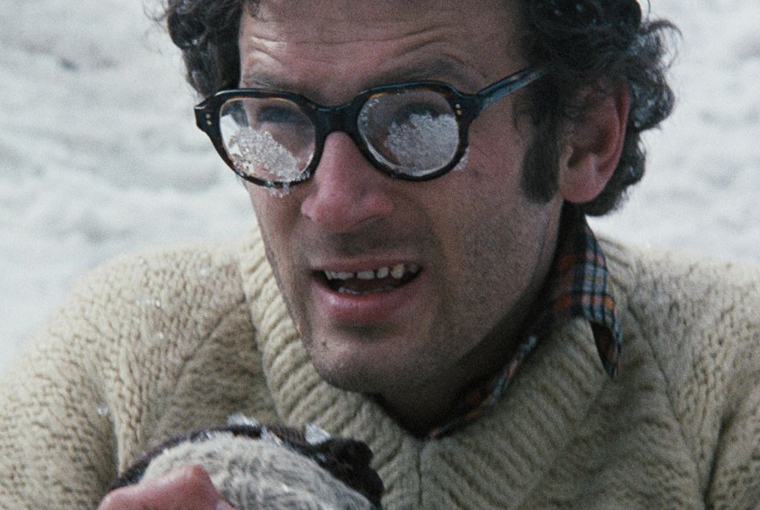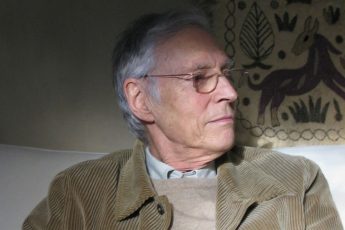The Normal Scientist
Krzysztof Zanussi’s Illumination (Iluminacja, 1973)
Vol. 42 (June 2014) by Moritz Pfeifer
Most films about scientists either treat them as evil Dr. Frankensteins (Gregory Peck as Dr. Mengele in Boys from Brazil, Marlon Brando as Dr. Moreau in The Island of Dr. Moreau, Peter Sellers as Dr. Strangelove) or as heroes (Dr. Alan Grant as the main protagonist in Jurassic Park, Jody Foster’s character in Contact, Denis Quaid as the climate scientist in The Day After Tomorrow), sometimes playing out one against the other via a specific moral dilemma: what are the costs/benefits of weapons of mass destruction (Fat Man and Little Boy), cloning (Jurassic Park) or medical interventions (Coma)?
Scientists and film scholars often criticize this. In a 2005 study entitled Mad, Bad and Dangerous?: The Scientist and the Cinema the British scholar Christopher Frayling contents that “popular films have tended to present scientists as either impossibly mad or impossibly saintly.” In 1998, a conference at Columbia University in New York was held under the title Dialogue aimed at getting beyond ,mad scientist‘ stereotypes in film, in which scientists urged filmmakers to paint a more balanced portrait of their profession. This may seem odd. Is there any profession which popular movies do not divide into excessively good and excessively bad camps (cf. has there ever been a NYPD round-table in which cops plead for a more nuanced representation of their activity)?
Nevertheless, more neutral films have since risen in popularity. Indeed, the somewhat morality-free genre of the scientist as a reclusive genius (Good Will Hunting, Proof) whose personality is neither crazy nor heroic enough to invoke madness or sainthood could be mentioned as a more serious attempt of portraying scientists in the movies. Most of these geniuses are mathematicians which may be part of the reason why they appear less hyperbolic – it seems to be considerably easier to morally use/abuse knowledge about cloning a T-Rex than advancements in algebraic graph theory. That may also be the reason for which films about mathematical geniuses have another problem: most often, they are not really about science (or maths), but about the everyday struggles of their protagonists. In that, they resemble a tradition of biopics about scientists. Ironically, films like A Beautiful Mind (about the economist and mathematician John Nash), Infinity (about the physicist Richard Feynman) and even films where the science is less complicated like in Les Palmes de M. Schutz (about Marie Curie) always manage to substitute the pursuit of knowledge with biographical schmaltz.
Scientists invented cinema, but cinema has turned its back on science. The real problem of this is not that films about scientists create stereotypes, but that a huge chunk of them barely deal with scientific practice at all. They don’t treat science as something along the lines of describing, explaining, and predicting the world we live in. More philosophical questions like “what makes a scientific description true and how can it be justified?” or “What are the right methods and what is the purpose of science?” don’t get asked. These are perhaps the single-most underrepresented aspects of any film featuring scientists. A buddy-cop film will always, all dynamite extravaganza aside, still be a film about cops chasing criminals, which is what cops do. But films about scientists have awkwardly succeeded in replacing what scientists do with what our culture does to science, with what Nobel-prize laureates do outside the laboratory, or with what antisocial erudites don’t do. True, science as an intellectual practice may lack the dramatic and visual qualities to make a good film. How many films have there been on other brain-dominant activities like philosophy or writing? But how much “hard science” is needed to give a convincing artistic representation of scientific practices?
Consider Faust, the archetype of the scientist. Faust is neither a hero nor a monster. Faust’s major problem is to turn the for him divine conviction that “in the beginning was the word” into the more mundane “in the beginning was the deed.” Philosophers of science described this less poetically as the necessity to prove scientific claims with observation, aka empiricism or verificationism. Sokurov’s cinematographic version of Faust depicts these musings rather convincingly. He doesn’t even need to show the Doc trying to figure out the provability of some formula. Love is enough. Faust is nuts about Gretchen and wants to spend a night with her, an idea which is, like many scientific claims, easier said than done. Thus Faust’s experience of life turns into a metaphysical and epistemological problem. What kind of truths are there in life? How do we know them? And so the audience learns stuff about scientific inquiry, what its problems are and whether and how they can be resolved. Most importantly though, Faust is a deeply scientific movie that gets by without any details of hard scientific data.
Not many movies treat scientists in this way. Another example is Krzysztof Zanussi’s Illumination. The movie documents the life of a fictional physicist called Franciszek Retman (Stanislaw Latallo). Like Faust, he tries to seek the meaning of life in science but is not satisfied with the answers it provides. He subsequently looks for love, friendship, and religion before returning to science. Like Faust, Franciszek is torn between scientific responsibility and personal desires. In one scene in the beginning of the film, a student addresses this dichotomy in a conversation with his comrades. He is the only one questioning their big words on duty by speaking about their real choices. “If we wanted glory and money” he says, “we would all go to the West. But the fact that we are staying shows that we want other things: the privileges of power.” The political situation in which they are trapped in certainly nourishes their frustration. Some scenes of the film were censored before its initial release in 1973, so one can imagine that the intentions of the film were to highlight this political aspect even more. Nevertheless, Zanussi’s film is not about making any scientific choice, like making public a secret formula or magic pill. And it is also not about personal problems unrelated to science, like being antisocial or handicapped.
Zanussi’s protagonist is perhaps the simple, everyday scientist scholars and scientists would like to see. But like Faust, he gets by without science. Franciszek specializes in solid mechanics, but he might as well have worked in fluids for the story to work. The scientific relevance of the film only takes place on a philosophical or meta level. It asks what the purpose of science is by asking what the purpose of life is. One answer is given by Władysław Tatarkiewicz, a philosopher, who is interviewed in the beginning of the film. He explains what the medieval philosopher St. Augustin meant with the term “illumination”, namely, a kind of “eureka moment” of sudden access to knowledge and wisdom. Some scientists still mention such a spiritual pursuit of happy thinking as a goal in itself, which has a long tradition in occidental intellectual history. On this view, knowledge is some kind of experience of immediate perception. Others have a more utilitarian view. They argue that science should serve a purpose besides accumulating more and more knowledge. Zanussi gives a voice to this view, in the idealism of the students. Both views conflict in the protagonist whose scientific practice neither grants him to experience a “eureka moment” nor to serve society in a meaningful way. Franciszek is expected to teach knowledge that was already outdated when it was being taught to him.
Good films are about humans, not about professions. The artistic representation of a job should not be determined by the accuracy of details of what it takes to execute a particular professional activity. Science more particular can perfectly attain a meaningful place in cinema, indeed, even be a film’s central subject, without there being the necessity to create a true or pseudo-scientific background. Zanussi’s Illumination accomplishes this by creating a dialogue with the scientific crisis of his time.




Leave a Comment